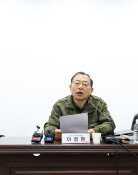Dilemmas facing ASEM
¡°If such universal values and visions as democracy and human rights, people' social participation and the rule of law are rejected, dialogue with the Asian countries is itself meaningless.¡± (European nations). ¡°What will happen if such assertions constitute undue interference in domestic affairs?¡± (Some Asian nations). These are portions of the recent conversations between diplomatic working-level officials over the wording of the draft "Asia-Europe Cooperation Framework 2000 (AECF 2000) declaration. Foreign Affairs and Trade Ministry officials disclosed that the atmosphere was often strained due to conflicting views in the course of preparing for the upcoming Seoul ASEM conference.
Behind the pompous ASEM, dubbed the diplomatic Olympics, lurked this struggle. Specialists said that the ASEM conference is faced with a basic dilemma, as the Asian and European regions have differences in political, economic, social and cultural affairs that are extremely difficult to reconcile. The ASEM underlines political dialogue, which separates it from the economy-oriented APEC (Asia-Pacific Economic Cooperation), but the member states failed to promote lively dialogue.
Ahead of the first ASEM held in Bangkok in 1996, some Asian countries insisted that democracy and human rights should not be included in the agenda. The ministry noted that related officials have faced major obstacles in determining the concrete programs to be adopted at the Seoul conference, mainly due to the discord between European nations, which are proposing democracy and human rights issues for the conference agenda, and Asian nations opposing the inclusion of these matters.
Secondly, since the Asian states are less homogeneous than the European region, they find it difficult to form a united voice and to realize mutual cooperation given the lack of a definite leading country. The ministry official in charge of the ASEM conference said that the European Commission and the chair country have a tradition of coming up with a united position for consultations, but Asian nations often failed to adopt a common and coordinated stance. In particular, due to conflicting interests among Japan, China and Korea, it is hard to expect effective agreements and outcomes.
Finally, another problem is that it is impossible for non-ASEM states to join the forum if even a single member opposes it. There are about 20 nations that hope to be admitted to the ASEM, but they will be granted membership only when they are approved by both the regional consultations and plenary session. Therefore, if a member state raises objections to the admission of a certain country for whatever reasons, the subject state will never be allowed to join the body.







